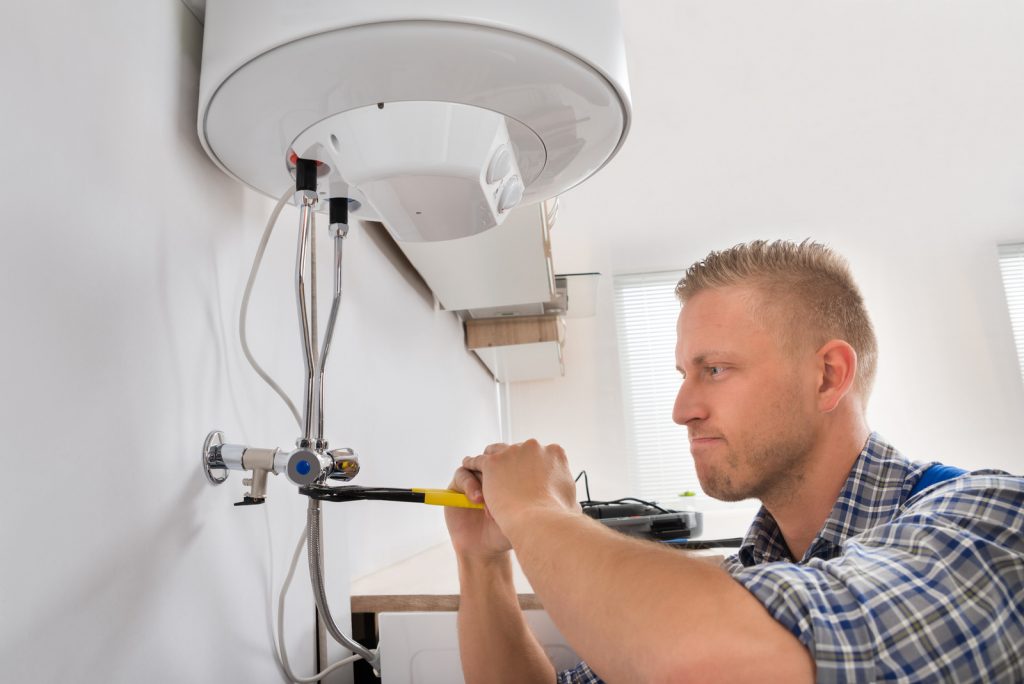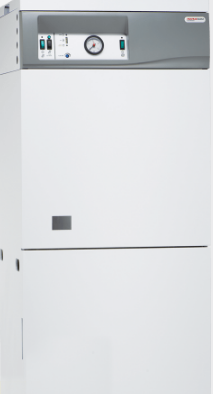With the government saying they will be phasing out gas boilers over the next few years to reduce fossil fuel use, electric boilers are becoming a realistic alternative to take their place. They are available now and have predictable reasonable costs, unlike hydrogen fuel which is still being developed and air and ground source heat pumps that are prohibitively expensive at the moment.

An electric boiler heating system is clean and almost 100% energy efficient, easy to install and economical to run. They use simple technology and have fewer moving parts than gas or oil fired boilers. Electric boilers are powered from your main supply to heat a series of elements inside, which heats the water like an electric kettle.
They need to be sized correctly to heat your home. The size here refers to the power output which is measure in kilowatt hours (kW). The higher output, the more powerful the boiler is. Once the water has been heated it’s pumped around the house to where it’s needed.
Just like a gas fired boiler, it can heat your central heating radiators, underfloor heating system. Solar panels and the hot water cylinder for all your hot water requirements.
What electric boiler size is needed?
A average sized room with double glazed windows and cavity wall insulation will require a 1.5kW output radiator. So a property with 6 radiators will need a 9kW output boiler. In most cases, the maximum number of 1.5kW radiators an electric boiler can handle is 10, so they are only really suited to smaller properties.
Electric boilers come in a variety of sizes that will fit almost anywhere in your home and they don’t require any gas supply pipes or a flue to remove fumes. They are very easy to maintain and require less checking so you won’t need annual check like with a gas boiler.
They are generally smaller and more compact than gas or oil boilers and because they don’t need a flue they can be fitted almost anywhere so you don’t have to worry about finding an outside wall to remove toxic fumes such as carbon monoxide. Electric boilers still need to be protected from moisture and frost.
Additionally, you don’t have the issue of fuel storage tanks, say if you live in an area not connected to mains gas and have to rely on oil-fired boilers. Another benefit is that they are very quiet in operation and you will hardly hear it start up.
An important point is the size of the incoming electricity supply to your property. Will this need to be upgraded to handle the extra demand from an electric boiler? They are a high power using products, and so require their own circuit.
It could become be an extra installation cost associated with the boiler, especially with the larger output models above, say, 12kW.

Advantages of electric boilers
- With electric combi boilers, there is no need for fuel storage like oil boilers.
- Don’t need to be connected to mains gas supply.
- Very quiet when operating.
- Can be fitted almost anywhere without needed flue pipes to an outside wall.
- More compact and smaller that most gas and oil boilers.
- Don’t need an annual safety check like a gas boiler.
- Have fewer moving parts inside so easier to maintain.
What sizes do electric boilers come in?
The sizes range from a 3W to 15kW for single phase boilers for domestic use. In terms of the size of the unit despite the fact the 12kW does a lot more than the 4kW, the size of the actual unit that goes in your home has no size difference. The higher output boilers are slightly heavier but they are exactly the same size.
You can get electric boilers just for the heating system and can pretty much connect to existing wet central heating system radiators, or they come in combination models for both heating and instant hot water use. These have a much higher output.
With electric combi boilers, you will still have the issue of low pressure in the hot water taps if more than one is opened at the same time, but you can choose to have a hot water storage cylinder that will compensate for this. These cylinder tanks can store around 180 litres so can take up some space.
What are the different types of electric boiler?
Boiler with storage
This comes with a storage cylinder either inside or outside for a larger capacity. It can meet the hot water needs of more than one tap at the same time.
Combi boiler
Just like a gas combi boiler, it provides heating and instant hot water from one unit. There is no storage required as cold water is taken from the mains to be heated up for the taps. They save space and cost.
Flow boiler
They heat water for radiator systems and work with standard radiators, programmers, room thermostats and thermostatic radiator valves. These type of boilers are perfect for apartments, loft conversions or conservatories where space is limited.
Things to look out for with electric boilers
When looking to purchase a boiler, make a note to look for the following points:
- Amp rating. Will it be suitable for the wiring in your house?
- Energy rating. Most electric boilers are rated D even though they are highly efficient. This is because there is a much higher loss of energy as the electricity makes its way from the generation company through the grid to your home.
- Electrician required. If you are replacing a gas boiler with an electric, you will require the services of both a gas engineer and an electrician.
Are electric boilers easy to purchase?
They are becoming more common and an average 6kW boiler can be bought from around £700. The cost of combi boilers can go up to £2300 for 18kW max output. Leading companies like boiler central have a variety of brands available to choose from. A boiler with a cylinder to supply the faucets will cost more with the extra pipework required.
What type of properties are electric boilers best suited for?
Electric boilers are best suited to smaller homes and flats because they can’t meet the higher heating and hot water demands of larger properties, especially in winter. They are also an alternative to oil fired boilers or those areas without mains gas supply.
*The information in this article should be used for general guidance only and not as financial or health advice. Full details are on the link in the footer to our disclaimer page. Always discuss your requirements with a competent and suitably qualified professional before undertaking any work.
Affiliate disclosure
Heatology.co are participants in a variety of affiliate schemes which help fund and run this website, visitors who follow our links and purchase a product may earn Heatology.co a commission. The money we make from affiliate marketing costs you nothing but keeps us online, so thank you for your continued support!

